"Americans are trying to achieve simple things [in Asia]. Firstly, they badly need the conflict around North Korea since they use it to justify their military presence on the Korean Peninsula. Imagine that North Korea is no longer an issue, what formal grounds would the US have to stay there?" he asked. "They also need the confrontation to maintain their military presence in Japan. They will once again use the latest launches as an argument in favor of deploying their missile defense system to Japan despite China's protests against THAAD in South Korea."
Fenenko, an associate professor at Moscow State University's Faculty of World Politics, maintained that North Korea has used such tests to force the United States, as well as South Korea and Japan to launch negotiations and provide financial and humanitarian assistance.
Defense analyst Vladimir Evseev told Sputnik that the latest launches come as no surprise since they merely reflect policies that both Pyongyang and Seoul have pursued for decades.
"Neither Pyongyang, nor Seoul have changed their policies. Pyongyang is not ready to make concessions. … At the same time it is trying to gain Beijing's support due to immense external pressure. However, it would be unwise to think that everything boils down to North Korea, since South Korea is doing what it has been doing and is not making any concessions either. [Seoul] is constantly holding large-scale military drills that are provocative in their nature. They are training for offensive operations aimed capturing Pyongyang, killing Kim Jong-un and destroying military facilities in the North," he explained.
Evseev further said that Washington has played a part in fueling the Korean conflict.
Georgy Toloraya, who heads the Center of Russian Strategy in Asia at the Institute of Economics of the Russian Academy of Sciences, told Sputnik that the trend remains unchanged since the United States, South Korea and Japan will continue to exert pressure on North Korea, while Pyongyang will respond with provocations.
Never miss a story again — sign up to our Telegram channel and we'll keep you up to speed!





